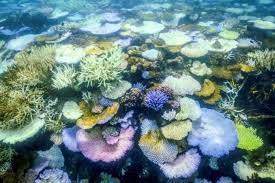Coral Mortality Crisis: Great Barrier Reef Faces Record-Breaking Coral Deaths Amid Environmental Stressors
The Great Barrier Reef, one of the world's most famous natural wonders, is facing an alarming crisis as parts of the reef experience record-breaking coral mortality due to escalating environmental stressors. Recent reports reveal that climate change, rising sea temperatures, pollution, and overfishing have combined to create a perfect storm that threatens the delicate balance of this vibrant ecosystem.
Coral reefs, known for their rich biodiversity and vital role in marine life, are highly sensitive to temperature fluctuations. The Great Barrier Reef has suffered from repeated bleaching events in recent years, where corals expel the algae living within them due to elevated water temperatures. This leaves the corals vulnerable, turning them white and weakening their immune systems. When temperatures remain elevated for extended periods, corals are unable to recover, leading to widespread mortality.
The current crisis is particularly severe, with some areas of the reef experiencing coral death rates that have never been seen before. This is largely driven by the intensification of climate change, which has led to more frequent and severe marine heatwaves. These heatwaves raise the ocean temperature, causing corals to undergo stressful conditions that lead to mass bleaching and, in many cases, death. Even though the reef has shown resilience in the past, this ongoing trend of extreme heat events is pushing it to a tipping point.
In addition to climate-related stress, other human-induced factors are exacerbating the crisis. Pollution from agricultural runoff, which introduces harmful chemicals and sediments into the water, contributes to coral degradation. Similarly, overfishing and destructive fishing practices, such as blast fishing, further disturb the reef's delicate balance.
The consequences of coral mortality extend beyond the immediate loss of biodiversity. Coral reefs are vital to coastal protection, serving as natural barriers against storm surges and erosion. The economic implications are also significant, as the reef generates billions of dollars annually from tourism and fishing industries.
Immediate action is needed to address the underlying causes of coral mortality. Governments, environmental organizations, and scientists must work together to implement stronger climate policies, reduce pollution, and protect marine ecosystems from overfishing. Without concerted efforts, the future of the Great Barrier Reef—and countless marine species—hangs in the balance.



No comments yet
Be the first to share your thoughts!